- Today's news
- Reviews and deals
- Climate change
- 2024 election
- Fall allergies
- Health news
- Mental health
- Sexual health
- Family health
- So mini ways
- Unapologetically
- Buying guides

Entertainment
- How to Watch
- My watchlist
- Stock market
- Biden economy
- Personal finance
- Stocks: most active
- Stocks: gainers
- Stocks: losers
- Trending tickers
- World indices
- US Treasury bonds
- Top mutual funds
- Highest open interest
- Highest implied volatility
- Currency converter
- Basic materials
- Communication services
- Consumer cyclical
- Consumer defensive
- Financial services
- Industrials
- Real estate
- Mutual funds
- Credit cards
- Balance transfer cards
- Cash back cards
- Rewards cards
- Travel cards
- Online checking
- High-yield savings
- Money market
- Home equity loan
- Personal loans
- Student loans
- Options pit
- Fantasy football
- Pro Pick 'Em
- College Pick 'Em
- Fantasy baseball
- Fantasy hockey
- Fantasy basketball
- Download the app
- Daily fantasy
- Scores and schedules
- GameChannel
- World Baseball Classic
- Premier League
- CONCACAF League
- Champions League
- Motorsports
- Horse racing
- Newsletters
New on Yahoo
- Privacy Dashboard
Predicting crime: The science behind 'Minority Report'
- Oops! Something went wrong. Please try again later. More content below
It's been 21 years since Minority Report , which is now streaming on Peacock , hit theaters and brought the notion of pre-crime to movie-going audiences around the world. Based on Philip K. Dick 's novella The Minority Report , the story centers on three clairvoyant humans known as precogs, capable of predicting violent crime before it happens. John Anderton ( Tom Cruise ), the pre-crime chief who is tasked with stopping the would-be crimes the precogs predict, is himself accused of a murder he hasn't committed ... yet.
RELATED: Stream Minority Report right now on Peacock.
As Anderton evades the law, including his own coworkers, in an attempt to clear his name, audiences are asked to consider the morale calculus of convicting people in advance of crimes, even if it means saving lives. So far at least, it's not a question we've actually had to consider. The laws as they are written today require you to have committed a crime or be in the process of committing a crime in order to be held liable — at least that's how things are supposed to work — but might we someday reach a point where our ability to predict human behavior stops crimes before they happen?
CAN HUMAN BEHAVIOR BE ACCURATELY PREDICTED?
In theory, maybe? It kind of depends on what version of reality you subscribe to. Probably we can look at demographics, family histories, and life experiences, and predict with some level of confidence what a person is statistically likely to do, but that's not the same as saying that John Anderton will commit a murder on a specific date in 2054.
In order for precrime to really grab hold, we'd need a system for reliably predicting precisely what a person will do at any given time. Some philosophers take this for granted, at least hypothetically, as a consequence of hard determinism .
Modern science is built on the foundation that things in the natural world are predictable . The laws of nature act on bodies like stars and planets and send them whirling about their celestial planes on measurable, predictable paths. We can predict eclipses far into the future, down to the minute and we can predict orbital paths of space probes as they maneuver between planets on their way out of the solar system. That's because we have a decent understanding of the forces they'll encounter along the way.
Determinism presupposes that human beings are no different, at their core, than a ball bouncing down a hill. Throw someone at any situation at a given time, speed, and with a lifetime's worth of prior causes and experiences, and they'll react in ways which are determined by those prior causes and experiences. The hard determinist suggests that human behavior is unpredictable today not because it's fundamentally so, but because we don't have the computing power — either inherently or technologically — to crunch the numbers on how they'll react.
Precogs in Minority Report (2002) Photo: Minority Report (2002) Official Trailer #1 - Tom Cruise Sci-Fi Action Movie/Movieclips Classic Trailers
Given a sufficiently powerful computer, or a set of precogs, and you could know the future in quite the same way as we know the past. Indeed, such a worldview suggests that from the moment of the Big Bang, the universe has played out, and will continue to play out, in the only way it ever could have. It's almost as if existence is reading out a script and each of us is only a player in a pre-planned drama 14 billion years in the making.
Of course, quantum mechanics throw something of a wrench in this way of thinking. There appears to be a certain amount of uncertainty built into nature when you drill down to the very small. However, there is an argument to be made that the quantum gap in our understanding is just that, rather than true randomness. Whether that is borne out remains to be seen. It might also be true that quantum randomness fades away in macroscopic systems, as certainly seems to be the case when we look at stellar systems and galaxies. The question then becomes which side of the boundary human beings reside in.
If we accept that we are purely material objects — that we are not fundamentally different from anything else in the universe, however chemically complex we may be — then it stands to reason that our actions are as predictable as anything else. That would mean that, eventually, we may need to reckon with predicting crime and all of the moral quandaries that come with it.
PREDICTIVE POLICING IN THE REAL WORLD
In the absence of a computing entity or a trio of mutated human psychics capable of predicting our every action, law enforcement agencies are turning to algorithms, and they are not perfect!
Many police precincts around the United States are relying on predictive algorithms to tell them where to patrol and what they might expect on their beat. As reported by Science , policing entities are increasingly relying on computer programs to analyze the patterns of crime in their neighborhoods as a means of determining where crime might happen next.
Tom Cruise playing the system in Minority Report (2002) Photo: Minority Report (2002) Official Trailer #1 - Tom Cruise Sci-Fi Action Movie/Movieclips Classic Trailers
Fundamentally, this makes a certain amount of sense, if crime exists in a particular area, then it's likely to propagate outward from there. Verbal scuffles tend to evolve into violent altercations, but there's likely a gap in the way we calculate these sorts of crimes. Prior observations have shown exactly what we expect that crime begets crime. Where there's one crime, there's more than likely to be another.
The reality is, however, that biases inherent in our every day lives persist in our computer programs. Computer algorithms are only as good as the data we feed into them, and studies have shown that they carry and sometimes exacerbate racial and demographic biases, whether we consider them consciously or not.
At present, police entities are using algorithms to identify not just potential criminals, but also potential victims and they struggle to differentiate between the two. As mentioned in the above study, effectively predicting crime would require a 1,000-fold increase in predictive power before it could reliably pinpoint crime.
The fact is that we can't reliably differentiate between victims and perpetrators and until we can, our predictive algorithms are less than worthless, particularly when we consider the racial and class biases inherent in our calculations. While predicting crime might be the future of our society, it's only as good as the inputs we provide, and those are questionable at best.
Stream Minority Report now on Peacock .
Ready to blast off? Download SYFY's free app to watch full episodes and tons of extras.
Watch The Ark
Recommended stories, sparks rookie cameron brink: 'there's a privilege' for wnba's younger white players.
The Sparks rookie had plenty to say about her WNBA rookie class, headlined by Caitlin Clark.
Angel Reese's 'weak' ejection from Sky-Liberty game draws attention, offer from Bulls' Lonzo Ball
Reese was ejected after two very quick whistles from referee Charles Watson.
Larry Allen, Cowboys legend and Pro Football Hall of Famer, dies at 52
Allen was a seven-time first-team All-Pro and part of the Cowboys' Super Bowl XXX winning team.
Sky's Chennedy Carter has 'no regrets' about foul on Caitlin Clark; Angel Reese will 'take the bad guy role'
The Sky have broken their silence about the flagrant foul on Caitlin Clark, and they had a lot to say.
Vikings reveal 'Winter Warrior' alternate all-white uniforms to be worn on Week 15
The Minnesota Vikings revealed their all-white "Winter Warrior" uniforms that the team will wear for Week 15's matchup with the Chicago Bears.
GameStop stock soars as 'Roaring Kitty' announces livestream, reveals $382 million unrealized gain
First X, then Reddit, now YouTube. GameStop's most bullish enthusiast announced a livestream, and the stock surged.
Rivian's path to survival is now remarkably clear
Rivian has had a lot on its plate as it transitioned from pitch mode to selling EVs. It created an electric pickup and an electric SUV while prepping a monster IPO. It now plans to sell an even cheaper SUV that could make Rivian a dominant EV player for years to come.
Paul Skenes blows away Shohei Ohtani, who returns the favor in his next at-bat
The Dodgers-Pirates matchup lived up to its billing.
Yes, Marshall's has an online store — and we found 10 summer steals under $50
Tommy Bahama, Ralph Lauren, Jantzen: It's a treasure trove of deals — like going in person, but better!
2025 Toyota Crown Signia First Drive: Venza replacement puts efficiency and fashion first
Our first drive review of the 2025 Toyota Crown Signia where we tell you all about it and give initial driving impressions.
Log in or sign up for Rotten Tomatoes
Trouble logging in?
By continuing, you agree to the Privacy Policy and the Terms and Policies , and to receive email from the Fandango Media Brands .
By creating an account, you agree to the Privacy Policy and the Terms and Policies , and to receive email from Rotten Tomatoes and to receive email from the Fandango Media Brands .
By creating an account, you agree to the Privacy Policy and the Terms and Policies , and to receive email from Rotten Tomatoes.
Email not verified
Let's keep in touch.

Sign up for the Rotten Tomatoes newsletter to get weekly updates on:
- Upcoming Movies and TV shows
- Trivia & Rotten Tomatoes Podcast
- Media News + More
By clicking "Sign Me Up," you are agreeing to receive occasional emails and communications from Fandango Media (Fandango, Vudu, and Rotten Tomatoes) and consenting to Fandango's Privacy Policy and Terms and Policies . Please allow 10 business days for your account to reflect your preferences.
OK, got it!
Movies / TV
No results found.
- What's the Tomatometer®?
- Login/signup
Movies in theaters
- Opening this week
- Top box office
- Coming soon to theaters
- Certified fresh movies
Movies at home
- Fandango at Home
- Netflix streaming
- Prime Video
- Most popular streaming movies
- What to Watch New
Certified fresh picks
- Hit Man Link to Hit Man
- Am I OK? Link to Am I OK?
- Jim Henson Idea Man Link to Jim Henson Idea Man
New TV Tonight
- Star Wars: The Acolyte: Season 1
- Ren Faire: Season 1
- Sweet Tooth: Season 3
- Clipped: Season 1
- Queenie: Season 1
- Mayor of Kingstown: Season 3
- Becoming Karl Lagerfeld: Season 1
- Criminal Minds: Season 17
- Power Book II: Ghost: Season 4
- Erased: WW2's Heroes of Color: Season 1
Most Popular TV on RT
- Eric: Season 1
- Dark Matter: Season 1
- Tires: Season 1
- Evil: Season 4
- Star Wars: Ahsoka: Season 1
- Trying: Season 4
- Best TV Shows
- Most Popular TV
- TV & Streaming News
Certified fresh pick
- Star Wars: The Acolyte: Season 1 Link to Star Wars: The Acolyte: Season 1
- All-Time Lists
- Binge Guide
- Comics on TV
- Five Favorite Films
- Video Interviews
- Weekend Box Office
- Weekly Ketchup
- What to Watch
The Bad Boys Movies Ranked by Tomatometer
All 73 Disney Animated Movies Ranked
What to Watch: In Theaters and On Streaming
Vote For the Best Movie of 1999 – Round 4
House of the Dragon : Season 2 First Reviews: Gorgeous and Expertly Crafted, with Epic Dragon Fights
- Trending on RT
- The Acolyte First Reviews
- Vote: 1999 Movie Showdown
- The Watchers
Minority Report
Where to watch.
Watch Minority Report with a subscription on Paramount+, rent on Fandango at Home, Prime Video, or buy on Fandango at Home, Prime Video.
What to Know
Thought-provoking and visceral, Steven Spielberg successfully combines high concept ideas and high octane action in this fast and febrile sci-fi thriller.
Critics Reviews
Audience reviews, cast & crew.
Steven Spielberg
Chief Paul Anderton
Colin Farrell
Danny Witwer
Samantha Morton
Max von Sydow
Pre-Crime Director Lamar Burgess
Dr. Iris Hineman
More Like This
Related movie news.
The Untold Truth Of Minority Report
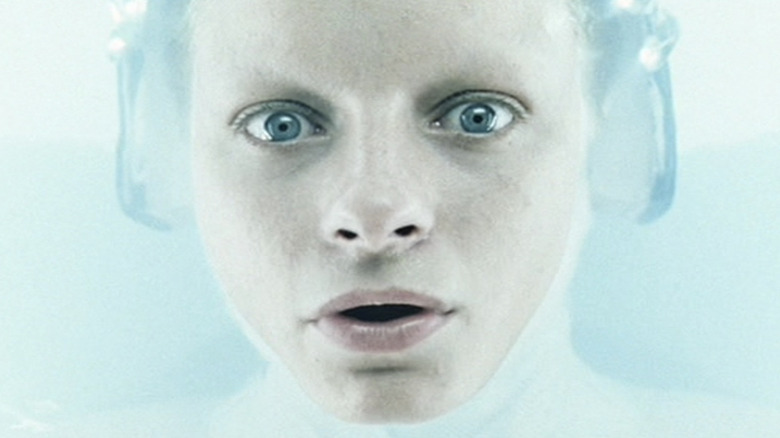
In 2002, Steven Spielberg and Tom Cruise joined forces for the first time for the blockbuster "Minority Report." This tale of a future America where crime is prevented before it even happens is a harrowing piece of cinema, and it's one that's thrilling but also has genuine weight to its depiction of a man on the run. There are grave consequences to everyone's actions, which only makes the story extra immersive. Coming out in the early 2000s alongside other darker Spielberg fare like "A.I.: Artificial Intelligence" and "Munich," "Minority Report" is a fascinating entry into one of the boldest eras of this director's filmography. Despite making quite a bit of money at the box office, though, there's plenty about "Minority Report" that most people simply don't know.
The history of "Minority Report" is wide-ranging and covers everything from how long Cruise and Spielberg had been planning to work together to the specific vision Spielberg had for this futuristic society to what movie "Minority Report" was originally supposed to be a sequel to. Much like with the tiniest details in a vision offered up by the future-seeing precogs, there's a lot to unpack in the untold truth of one of Spielberg's grimmest and most propulsive blockbusters.
Minority Report was once set to be a Total Recall sequel
Years before Steven Spielberg and Tom Cruise brought "Minority Report" to the big screen, audiences almost saw a radically different version of this project. Per Gizmodo , Philip K. Dick's short story "Minority Report" was optioned in the 1990s for a feature film that would be helmed by "Total Recall" director Paul Verhoeven. When looking over the story, Verhoeven felt it would be perfect material for a sequel to his 1990 film "Total Recall." The connection between these two sci-fi properties wasn't totally random, as "Total Recall" was based on another Phillip K. Dick story, "We Can Remember It For You Wholesale."
From there, the follow-up began to move quickly into production, with "Total Recall" leading man Arnold Schwarzenegger agreeing to come back for the sequel. However, just as the project was getting off the ground, Carolco — the production company in charge of the feature — went bankrupt. The script then got snagged by 20th Century Fox, who decided to make a stand-alone "Minority Report" movie that didn't have any connection to "Total Recall." This eventually lead to Spielberg's take on "Minority Report," which was co-produced by 20 th Century Fox. While the final version of "Minority Report" garnered widespread acclaim , fans of "Total Recall" are doubtlessly disappointed they never got a sequel to this film.
Why Steven Spielberg was attracted to Minority Report
There was a lot that might make "Minority Report" an attractive project for director Steven Spielberg. For one thing, it was a production that would unite the filmmaker with Tom Cruise, an actor he'd not yet had the chance to work with. For another, it was a science-fiction film, a genre Spielberg had extensive experience with, dating back to his work on "Close Encounters of the Third Kind" in 1978. Finally, the plot concerned a broken family, a recurring fascination for Spielberg in his films in everything from "E.T.: The Extra-Terrestrial" to "Empire of the Sun."
However, what specifically attracted Spielberg to the world of "Minority Report" was how it was largely something he'd never done before. Talking to Seattle PI, Spielberg noted that he'd never made a mystery movie like "Minority Report," which was steeped in the kind of uncertainty and griminess that defined so many vintage noirs he loved. He explained, "I had never structured a mystery before. ... I went back to (the ones) I remembered loving, like 'The Man Who Knew Too Much,' 'North By Northwest,' 'The Maltese Falcon' and 'Key Largo.' I had a field day looking at, you know, what's the protoplasm that makes those mysteries work." Within these exciting new confines, Spielberg was able to tap into some familiar storytelling elements , but it was the unprecedented aspects of "Minority Report" that truly excited him as an artist.
Tom Cruise and Steven Spielberg's long desire for collaboration
"Minority Report" wasn't just another Tom Cruise action movie nor was it just another sci-fi film helmed by Steven Spielberg. This was a momentous moment in the career of both of these men, as it finally gave Cruise and Spielberg a chance to work with each other. It was no coincidence that the duo was finally making a movie together on "Minority Report," either, as they had been trying to unite forces for years.
Speaking to Entertainment Weekly , Spielberg recalled how he had first met Cruise on the set of "Risky Business" back in the early 1980s. Right then and there, a spark began to form between the two and they were determined to work together. Cruise put it plainly: "I just knew I wanted to work with the guy. Even back then he was Steven Spielberg. The guy who did 'E.T.' and 'Raiders of the Lost Ark.”' Years went by, however, as they kept trying to figure out the perfect project to join forces on.
Things almost came together for them when Spielberg was set to direct Cruise on 1988's "Rain Man." However, Spielberg had to depart the film because of scheduling conflicts with "Indiana Jones and the Last Crusade," but he never gave up on his ambitions of directing a Tom Cruise star vehicle. Eventually, Cruise brought "Minority Report" to Spielberg, and suddenly, these years of yearning came to fruition. Finally, here was a production that united an iconic director with an equally iconic actor.
Minority Report was supposed to be made before A.I.
At the dawn of the 21 st -century, speculation was running rampant over what would be the next Steven Spielberg directorial effort. The filmmaker's last film had been the 1998 feature "Saving Private Ryan," which scored Spielberg his second Best Director Oscar win and was one of the highest-grossing films of the year (via Box Office Mojo ). These feats, combined with the man's reputation as one of the most acclaimed and successful directors ever, meant that all eyes were on where he would go next. "Minority Report" initially looked like a potentially ripe candidate to be the first Spielberg movie of the 2000s, especially once he turned down the opportunity to direct "Harry Potter and the Sorcerer's Stone" (via The Guardian ).
Plans to have "Minority Report" film in the first year of the 21 st -century were scuttled in March 2000 when it was announced that Spielberg would be helming "A.I.: Artificial Intelligence" first (via BBC News ). "A.I" was a production that had been lingering on Spielberg's "to-do list" for years, but it took precedent once Stanley Kubrick, who wrote the screenplay for "A.I.," passed away in March 1999. Kubrick had spent decades writing "A.I." and this, combined with the deep bond he and Spielberg shared, inspired Spielberg to make this film a priority. So, the start date of "Minority Report" got pushed to April 2001, which meant it would not have the honor of being Spielberg's first directorial effort of the new century.
Matt Damon was supposed to be in Minority Report
While Tom Cruise was always set to anchor the world of "Minority Report" as the protagonist John Anderton, several other actors came and went from the film's supporting cast over the course of its production. Many of these were massive names, who could've been right at home with the level of prestige associated with Cruise and Steven Spielberg. One such person was Matt Damon, who was approached to play a character who has a kinship with John, but then is forced to hunt him down when John is pre-accused of murder.
Per USA Today , Damon was interested in the part, and his then-recent Oscar win for writing "Good Will Hunting" would have made him an appropriately acclaimed artist for such a star-studded project. Plus, Damon and Spielberg had already worked together once before on the box office juggernaut "Saving Private Ryan." While Damon was dying to reunite with this filmmaker, it was never meant to be. Scheduling conflicts prevented him from joining Cruise in "Minority Report." Damon was already on the line to do "Ocean's Eleven" and the filming schedule for that Steven Soderbergh ensemble piece directly conflicted with "Minority Report." With that, "Minority Report" began to look around for someone else to take on the role instead (which eventually went to Colin Farrell).
Minority Report's newfound post-9/11 relevance
"Minority Report" was filmed in the summer of 2001 , and wrapped just a few months before the terrorist attacks of September 11 would forever alter the United States of America. In the wake of such devastating horrors, it was inevitable for people to read new 9/11-relevant layers into pieces of art that were never meant to talk about this historical event. When it came to "Minority Report," even director Steven Spielberg recognized how the project would inevitably come across as something that had extra important and timely relevance to moviegoers due to the state of the world after 9/11.
Speaking to The New Zealand Herald , Spielberg was upfront about how a film like "Minority Report" — which is about policing and privacy — would register with people in the wake of 9/11. He noted that the film mirrored how authorities were rounding up people in real life to get information and prevent future atrocities, saying "I feel that history has caught up with our imagination and given us a cold soak of reality." "Minority Report" would only become even more eerily relevant in the years to come, though, as the PATRIOT Act enhanced the surveillance of the American government on its citizens, while controversy over torture tactics on innocent civilians would make people question the lengths the United States had gone in the name of preventing future terrorist attacks.
The noirs that guided Spielberg's Minority Report vision
In many ways, "Minority Report" was a movie that could only exist in the 21 st century, namely with its digital-effects wizardry and its use of then-fresh-faced talent like Colin Farrell and Samantha Morton. But it's also a feature rooted deeply in one of the great film genres of the 20 th century: noir. Film noir — which literally means "black film" — often focuses on stories of lone protagonists, who must endure in the face of societies gone haywire due to moral corruption. So, it's easy to see why "Minority Report" would fit into the hallmarks of this genre.
But to ensure that "Minority Report" lived up to all of its potential, Spielberg opted to do a crash course in the all-time greats of the noir landscape before he started shooting this Tom Cruise vehicle. Talking to Entertainment Weekly , Spielberg said that he "wanted to give the movie a noir feel," and subsequently threw himself a film festival of classics of the genre: "Asphalt Jungle," "Key Largo," and "The Maltese Falcon" were the movies he turned to while molding his vision for "Minority Report." He also noted that he tried to embrace the darker edges of the genre in order to counter his "sentimental side."
How Spielberg approached technology within Minority Report
Much like our own modern world, the universe that "Minority Report" inhabits is one defined by technology. Not only is futuristic tech used to prevent crimes before they even happen, but virtual ads show up all over the place, while spider robots are used to hunt down lethal criminals. This is a world defined by machines even more than by the men that made them. Because of their importance to the story, Steven Spielberg was very careful about the role technology would play in "Minority Report" and how it would be realized.
According to Entertainment Weekly , Spielberg gathered a group of futurists and asked them to brainstorm about a plausible vision of what life in 2054 could be like. Talking to Roger Ebert , Spielberg elaborated that his goal with "Minority Report" was to make a movie where all the futuristic tech shown on-screen could eventually become a reality. This informed some hopeful details about "Minority Report's" vision of what's to come, including the idea of a transportation system that isn't as harmful to the environment. Simultaneously, he wanted to present an eerie quality to the intrusive nature of futuristic advertising.
Spielberg believed that "in the future, television will be watching us, and customizing itself to what it knows about us." He continued, "The thrilling thing is, that will make us feel we're part of the medium. The scary thing us, we'll lose our right to privacy." This dichotomy gets reflected in various spots in "Minority Report," which both demonstrates how far media and consumer materials have come, and also how nobody has privacy in this society on-screen. This approach to technology informed the urgent darkness of "Minority Report," but also proved prescient (or precognitive, if you will) in how the digital world would evolve in the decades to come.
Spielberg's insistence on practical sets
In the summer of 2002, both George Lucas and Steven Spielberg released new directorial efforts that were costly action blockbusters. Lucas debuted "Star Wars: Attack of the Clones," which heavily utilized digital sets. In contrast, Spielberg's "Minority Report" primarily employed practically realized backgrounds. Even though this mystery takes place in the future, Spielberg still went the route of building elaborate sets that the actors could see and feel as they shot the film. Though they had both come into their own as iconic filmmakers in the 1970s, the summer of 2002 made it clear that Lucas and Spielberg had drastically different aims now in terms of visual sensibilities and approaches.
Talking to Roger Ebert , Spielberg expressed admiration for "Attack of the Clones" and all that Lucas had accomplished with his digital sets. However, Spielberg also said that he was hoping to never get to the point where he was shooting movies that would involve just green screens and CGI sets, in part because physical sets stimulate and inspire the actors.
On "Minority Report," Spielberg was insistent that practical sets be used whenever possible, while even the most seemingly impossible pieces of camerawork — such as the overhead shot of the robotic spiders entering the building where John is hiding — were realized through on-set ingenuity rather than post-production digital wizardry. Spielberg's commitment to old-school production design choices ensured that the world of "Minority Report" reverberated with tangibility and grit.
Samantha Morton's experience working with Spielberg
In reflecting on Steven Spielberg to OC Movie Reviews in January 2022, "Minority Report" actor Samantha Morton, who portrays the precog Agatha, had a startling declaration to make about this filmmaker: He's good at his craft. Referring to him as "an incredible filmmaker," Morton especially appreciates "Schindler's List." This 1993 Oscar-winning film struck Morton as the kind of feature that's brutal to watch, but also important to remind the world of atrocities that "should never happen again."
Morton's admiration for Spielberg goes deeper than just what he accomplishes as an artist, though. She also noted that he is "an absolutely amazing person to work for." Remarking that because she was "quite young" when she did "Minority Report," her experience working with Spielberg established a great threshold and "set the bar very high" for the remainder of her career.
Even better, Morton's fondness for Spielberg only deepened when she did the 2022 film "Save the Cinema," an inspirational drama about a small town trying to save a movie theater. The film is based on a true story about the mayor of the Welsh town Carmarthen sending a letter to Steven Spielberg in 1993, imploring the director to make it possible for "Jurassic Park" to be screened in Carmarthen (via Wales Online ). Amazingly, Spielberg responded and the film premiered in this small town the same day as in London. Realizing what Spielberg had done to help everyday people in real life only emphasized how much Morton adored her former "Minority Report" director.
The distinctive cinematography of Minority Report
Perhaps more distinct than any of the fight scenes or explosions in "Minority Report" is the look of the entire feature. The visual style of "Minority Report" is unique and feels drained of color, which complements the grim atmosphere of the film. Talking to The New York Times , Steven Spielberg noted that he used a process called bleach-bypassing to achieve this effect. Bleach-bypassing is done in post-production, and drains out the color from people's faces. Now instead of having cheeks and skin tone that radiate warmth, everyone in "Minority Report" has pale faces, which helps to accentuate their constantly intense and paranoid demeanors.
Spielberg noted that touches like this brought "to the photo-realism a kind of abstract expressionism," while several sequences were shot on 800 ASA film stock to further ensure an old-school grainy appearance that would make "it feel more like old noir." The end result was that "Minority Report" combined older-looking techniques and styles seen predominately in the 1940s with a modern tale and technology, which truly made it look like no other movie out there. This was especially the case among the big-budget blockbusters made at the dawn of the 21 st -century, which tended towards more modern and digital looks.
The box office run of Minority Report
"Minority Report" arrived in theaters with lots of hype, thanks to its between Tom Cruise and director Steven Spielberg. The melding of these Hollywood titans excited film fans, but there was also some concern wafting in the air around its release. Chiefly, this was an unusual blockbuster in the summer of 2002. This was a season dominated by lighthearted "Star Wars" adventures and the first "Spider-Man" movie (via Box Office Mojo ). These movies were a sharp contrast to the more grounded and darker noir-inspired tale that "Minority Report" was delivering. Spielberg and Cruise were also coming off titles that were widely perceived to be box office missteps ( "A.I." and "Vanilla Sky," respectively), a sign that even immortal legends could stumble financially.
In the end, "Minority Report" did manage to secure $358.8 million worldwide , more than tripling its sizable $102 million budget. This feature also came in ahead of other notable Spielberg titles globally , such as "Indiana Jones and the Temple of Doom" and "Close Encounters of the Third Kind." If there was a complaint to be had here, it's that "Minority Report" did get overshadowed by several other 2002 movies. While it was the 10 th biggest film of the year worldwide , domestically, "Minority Report" was in 17 th place . It even came in behind titles like "Signs" and "xXx," neither of which promised the union of Cruise and Spielberg. While it didn't crush all other 2002 movies, "Minority Report" was still a profitable exercise, reinforcing that Spielberg blockbusters can always draw a mighty crowd.
Minority Report at 20: How Steven Spielberg and Tom Cruise envisioned our problematic present in a not-so-distant future
The 2002 blockbuster continues to comment on the technological and institutional invasions of our privacy.
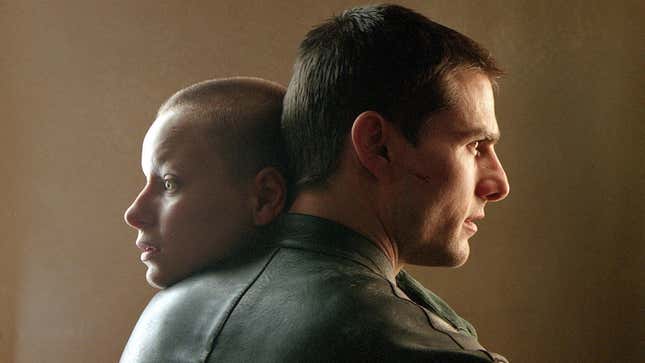
Twenty years after its theatrical release in June 2002, the futuristic thriller Minority Report remains a fascinatingly immersive and remarkably prescient blockbuster. The first film to pair Steven Spielberg and Tom Cruise (the director and the star would reteam for 2005's War of the Worlds ), Minority Report connected with audiences in a big way, pulling in nearly $400 million at the box office, a huge take for a film at that time.
Related Content
But it wasn’t just the star power of the Spielberg-Cruise pairing that attracted moviegoers. Adapted from the Philip K. Dick story of the same name, the film parlayed its themes of invasive technology and constant surveillance in the year 2054 into a story that resonated in 2002—and one that still reverberates in 2022 as we continue to grapple with tech’s pervasive and too often insidious influence.
Minority Report ’s ambitious vision of the future, using sets designed chiefly by Alex McDowell ( The Crow , Watchmen ) in conjunction with director Steven Spielberg and a think-tank of experts, set a striking tone for the film. The future was constructed as a collage of neo-noir and modernist aesthetics: blue-hued streets at night, hauntingly reflective holographic displays, sleek multi-directional cars, and most eerily, constant eye-scanners—reminiscent of our own cell phones and laptops—tracking every person in Washington D.C.
The script, adapted by Jon Cohen and rewritten by Scott Frank ( Logan , Queen’s Gambit , Out Of Sight ) into more of a character piece, was developed separately from the design of the film’s world. The result is a striking cinematic portrayal of the ways that the severe intrusion of privacy have become an irredeemable, inescapable facet of American society.
Tom Cruise, (future) crime fighter
Cruise stars as John Anderton, a high-ranking official in Washington D.C.’s Precrime Division, an experimental and well-funded policing enterprise looking to expand nationally. Three imprisoned psychics, known and semi-worshipped societally as the Precogs, experience visions of murders before they happen. The program has been so successful that premeditated murder has become a thing of the past in D.C. Now the Precogs only see crimes of passion; visions triggered by the emotional intensity that comes from spontaneous homicide. Those visions are then sifted through by Anderton, whose conductor-like haptic gestures rewind, fast-forward, and shift the visions through opaque glass that reflects the sterile, desaturated faces of himself and his fellow policemen.
Our initial exposure to this process is in the opening scene, via three perspectives. First we watch the vision of the lead Precog, Agatha (a poignant, eerie Samantha Morton), of a man murdering his wife and her paramour with scissors. Next Anderton and his team cross-reference Agatha’s vision with public records to triangulate the location of the murder. Spielberg then alternates the present scenes of Anderton’s search, with scenes in the expected murderer’s present, as he gradually picks up on the breadcrumbs that reveal his wife’s infidelity.
The dramatic, and temporal, irony in these scenes reflects the ways Anderton is initially separate from the world he inhabits. By exposing viewers to this would-be murderer’s point of view, the world engages them in the possibility that he’s being violated. Agatha’s vision is not necessarily set in stone, and the discrepancy between the dramatic point of view of Anderton, and the contradicting point of view of this man in Anderton’s world, plants seeds of doubt as to whether or not he really would have killed his wife.
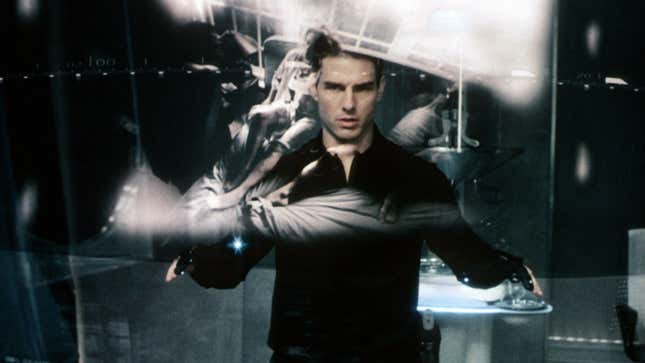
The emotional boundaries of limitless technology
Anderton’s ignorance to the surrounding perspectives, and his belief in the dystopic system, is driven by his grief and exacerbated by his dependency on illegal synthetic drugs. While high, he watches special-ordered holographic videos of his presumably dead son Sean—kidnapped under his watch at a public pool—and his estranged wife, Lara (Kathryn Morris). Anderton, whose private life is an indigo haze of retrospective pain, is unequipped to see beyond what’s initially presented to him, both by the Precogs, and by his duplicitous partner and mentor Lamar (played with disarming mischief by Max von Sydow), the director of the Precrime unit. It’s not until the world comes crashing down on Anderton, and the Precogs’ vision shows him as the murderer, that he loses the ability to wield his power over others, and is consequently challenged to see the fascistic effects of his predeterminist perspective.
In Minority Report invasiveness—personal and otherwise—is a given. Throughout Anderton’s desperate efforts to prove himself innocent, Spielberg’s camera (in collaboration with the sharp eye of director of photography Janusz Kamińsky) captures Anderton’s impositions into that world. When he fights off the jetpack-toting associates he helped train and who’ve been ordered to take him in, he makes life hell for every civilian that happens to be in his way. Anderton crashes his assailants through a window while a family is preparing for dinner, then launches the assailants up through the dinner table of another family who live above. He escapes at the cost of other people’s privacy. Holding onto his delusion of innocence, Anderton is insistent on running, ignorant to the disruptions he causes in the lives of the people around him.
This scene is mirrored later when Anderton becomes even more desperate. After realizing that his every move is tracked by the eye-scanners that monitor D.C., he engages the underground network from which he buys drugs to have his eyes replaced with someone else’s. While he recovers from surgery, Anderton’s fellow officers deploy a cadre of spider-like drones to search for him by scanning the eyes of everyone in the apartment complex where he’s hiding. In a virtuoso overhead one-shot, Spielberg follows as the insistent spider drones interrupt people during their most private moments (a couple engaged in passionate sex, a taciturn man sitting on a toilet) to scan their eyes and confirm their identities, all before the crawling bots finally close in on Anderton.
The expanded perspective of the camera suggests the developing perspective of Anderton: By literally seeing the world through another person’s eyes, Anderton put himself in a more vulnerable position, the position of a civilian. Like the Norse God Odin sacrificing his eye to see Ragnarok, the end of the world, Anderton is now more privy to the danger of weaponizing precognition to intrude upon the intimacy of others.
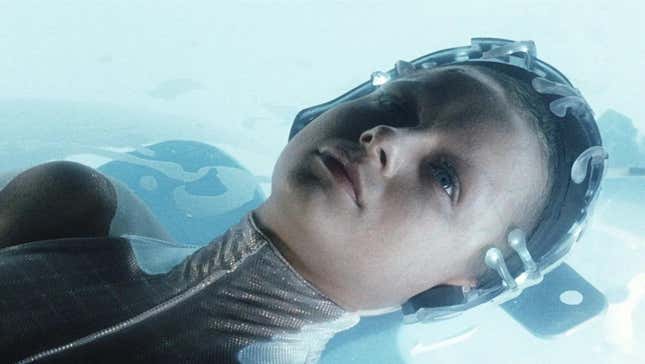
A cop awakens to a criminal’s perspective
These are the moments that the intersection of the imaginative world and story of Minority Report feel the most engaging; when the design of the world pushes Anderton through a physical ringer, wearing him down to a point where he can recognize the impact of his actions. Beat-up and literally deformed by an enzyme that disguises his face, Anderton kidnaps the Precog Agatha in search of his minority report—the alternate version of the future Agatha sometimes sees—as proof he won’t commit murder. But in the pursuit of that goal, he becomes more open to the suffering of others in his world, and gradually unveils the truth about Agatha, whose mother was killed by Anderton’s mentor, Lamar, to preserve the Precrime program.
John never gets the minority report he wants from Agatha. She instead helps to remind him that he has a choice; that the grace he was unable to extend to the people he arrested, the foreknowledge of his own murder, is also the opportunity to choose otherwise. Though Anderton chooses not to be a murderer—at least not purposefully—the film spirals towards a dénouement where Anderton works with Agatha and Lara to reveal the crime that gave birth to the Precrime program. Lamar commits suicide, Precrime is disbanded, Anderton reconnects with his wife who becomes pregnant once more, and the Precogs are allowed to live the rest of their lives at a cabin far from the chaotic futures of other people.
However, before all of that, Agatha delivers another, unexpected minority report, a vision triggered by the love she feels in the room of Anderton and Lara’s lost son, and a touching counterpoint to the emotions of anger and desperation that trigger her visions of crimes of passion. John admits how much he misses his son out loud, connecting with Agatha, who reflects/reveals that her mother was murdered for wanting Agatha back after having given her up due to drug addiction. He asks Agatha to tell him who killed her mother. She screams for John to run, but it’s too late. He’s captured and imprisoned.
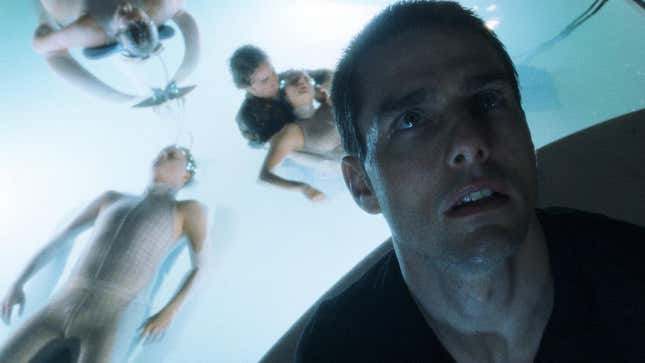
Exploring the mysteries of the third act
There’s a theory that the third act of the film, full of maybe too-satisfying resolutions, is the dream of the captured Anderton. A haunting shot that caps off the film’s second act is the strongest evidence of this. We see John, comatose, in a graveyard of luminescent, floating pods, all people he put away while working for Precrime. “They say you have visions,” says the bemused prison watchmen, “That your life flashes before your eyes. That all your dreams come true.” Anderton’s pod descends, and he is left alone in a darkness whose only illumination is the glowing halo that keeps him unconscious.
From that point on, we never see Anderton actually escape the facility, but the film’s third act seems to cater to his deepest wishes; his wife is assured he wasn’t a murderer, Agatha’s mother is given justice. Even Lamar, the closest thing Anderton has to a father figure, apologizes as he collapses and dies by his own hand. But if it’s a dream, where is Anderton’s lost son, Sean? But the admittance of his grief after Agatha’s account of Sean’s alternate future, the unexpected but more meaningful minority report, may have opened his mind and heart to desire further resolution beyond his loss. Especially in Spielberg’s sentimental hands, there’s little reason not to accept the warm resolution of the film. But the possibility of an even darker ending, where the bad guy wins and Anderton pays for his lack of perspective, aligns with the film’s sci-fi dystopia, and noir roots.
Minority Report was the first of two features released by Spielberg in 2002 that featured a lead character desperately running from the inescapable, monitoring influence of a larger American institution. The second was Catch Me If You Can , and in both films, running proves to be futile. And yet, both films have disarmingly positive endings. But what’s remarkable about Spielberg’s filmmaking is the contrast between captivating, emotionally inviting images that draw us to the symbolic foundations of Western society, and the shadows of corruption that haunt them.
Whichever of Minority Report ’s endings is the “right” one, its doomed path towards a surveillance state marches on into our current all-seeing, all-recording present. But the fact that Spielberg has historically leaned into sentimentality as one of his greatest tools makes him especially prescient in depicting next-generation technology; because as Anderton demonstrates, it’s the intimacy—and power—of emotion which ultimately may mark the right (or wrong) choice between seemingly predestined futures.
Minority Report (2002)
- User Reviews
Awards | FAQ | User Ratings | External Reviews | Metacritic Reviews
- User Ratings
- External Reviews
- Metacritic Reviews
- Full Cast and Crew
- Release Dates
- Official Sites
- Company Credits
- Filming & Production
- Technical Specs
- Plot Summary
- Plot Keywords
- Parents Guide
Did You Know?
- Crazy Credits
- Alternate Versions
- Connections
- Soundtracks
Photo & Video
- Photo Gallery
- Trailers and Videos
Related Items
- External Sites
Related lists from IMDb users

Recently Viewed
The Definitive Voice of Entertainment News
Subscribe for full access to The Hollywood Reporter
site categories
‘minority report’: thr’s 2002 review.
On June 21, 2002, Steven Spielberg and Tom Cruise unveiled the thriller 'Minority Report' in theaters.
By Kirk Honeycutt
Kirk Honeycutt
- Share on Facebook
- Share to Flipboard
- Send an Email
- Show additional share options
- Share on LinkedIn
- Share on Pinterest
- Share on Reddit
- Share on Tumblr
- Share on Whats App
- Print the Article
- Post a Comment

On June 21, 2002, Steven Spielberg and Tom Cruise unveiled the thriller Minority Report in theaters, where it became a summer hit and, later, an enduring sci-fi classic. The Hollywood Reporter’s original review is below:
All good science fiction is really a speculation about social and political trends. Thus, Steven Spielberg’s Minority Report , a rousing film-noir suspenser set in a world of labor-saving devices and McLuhan-esque technology, is a thought-provoking inquiry into just how far we as a society want to go to make our environment safe.
Spielberg poses the question in one of his most compelling and entertaining films ever. Following A.I. Artificial Intelligence , he continues to push into new fictional terrain that is grittier, creepier and edgier than the warm-and-fuzzy science fiction of his early career. And he is willing to leave an audience unsettled. Even with something of a happy ending, Minority Report is the most troubling kind of speculative fiction. There is much to absorb here, almost too much for a single viewing, which probably means the kind of repeat business on which box-office bonanzas are built.
For star Tom Cruise, too, the point of reference is his last film, Vanilla Sky , where he also played a man caught in a technological nightmare in which his very identity and destiny get thrown into confusion. While going over the top in that film, here he delivers one of his most controlled and suggestive performances. Pain and hysteria stay bottled up within his character, a man who completely buys into a crime-prevention system then finds himself outside that system, battling the very thing that gave him self-worth.
A complex, intricate screenplay by Scott Frank and Jon Cohen derives from a story by sci-fi master Philip K. Dick. The film takes place in Washington a half-century from now. Cruise’s chief John Anderton heads an experimental Pre-Crime unit, which takes advantage of a freak scientific accident that produced three psychic human beings, who can see murders before they occur.
In Pre-Crime headquarters, these “Pre-Cogs,” bathed in biological fluids and drugged into a semi-comatose state, channel horrific visions of the future into a computer. John brings these images up on a large glass screen, where he can separate and analyze the pictures to glean clues about the “victims,” the “murderers” and sites of these crimes, thereby preventing them from ever happening. In six years, the Pre-Cogs have never been wrong. Or have they?
(This elite unit operates only in the D.C. area, but the government plans to take the system nationwide. The major plot hole is that nothing explains why the psychic abilities of the Pre-Cogs extends only as far as D.C. or how the government intends to expand those abilities across the nation.)
John is a man on a mission. He lost a small son six years before and, haunted by that crime, buries himself in crime prevention. Then suddenly, the Pre-Cogs insist he will murder a stranger within 36 hours, forcing him to run from his own unit. A rival FBI agent (Colin Farrell) is also hot on his trail, a pursuit made all the easier by the fact that his Magnetic-Levitation car can be controlled by others, and scanners throughout the city track anyone’s whereabouts by scanning the eyes.
As John runs, he must figure out not only why he would kill a total stranger but — if he is indeed being set up — what this has to do with his tragic past, his boss (Max von Sydow ), estranged wife (Kathryn Morris) and a research scientist (Lois Smith) who developed the Pre-Cogs.
The film has several amazing set pieces few filmmakers could pull off. There is a terrific chase between Cruise and his own elite police force through mean inner-city streets and into a robotics car factory. In a later sequence, a disguised Cruise must break into Pre-Crime headquarters and spirit away a Pre-Cog, Agatha (Samantha Morton), who holds the key to his salvation. There is also a very creepy sequence in which a doctor (Peter Stormare ), operating — literally — outside the law, performs a dual eye transplant on Cruise in the grimiest of tenements.
While Cruise anchors the movie, a brave performance by Morton and rock-solid supporting work give the movie extra ballast. Shorn of hair and eyebrows, Morton is a fragile figure, waif-like yet willfully determined to have a hand in her own liberation despite a time-continuum confusion. Farrell is suitably oily as an antagonist who is not quite a villain but might have resisted the cliches of gum chewing and a three-day beard. For von Sydow , this is an overly familiar performance, but Smith and Stormare offer off-center personalities that enliven their individual scenes.
The details of this future world filter out as part of the film’s narrative drive rather than as show-off effects. One of John Williams’ subtlest scores in years, somewhat reminiscent of the work Bernard Herrmann did for Hitchcock, brings a certain amount of tension without his usual lush orchestrations. Longtime Spielberg cinematographer Janusz Kaminski’s de-saturated color pulls all the disparate worlds — the scruffy streets, cold and gleaming interiors, magnetic highways and the womb-like Pre-Cog Chamber — into a dark, unified whole.
As more aspects of science and crime-fighting in this future society emerge, the film probes the moral underpinnnings . The Orwellian nature of the new technology is obvious, but Spielberg sees this less as the intrusion of Big Brother than Big Business. The eye scans, useful to police, are vital to commercial interests to track customers. Technology is not necessarily the enemy — homes spring to life in helpful, efficient ways — but privacy vanishes. — Kirk Honeycutt , originally published on June 17, 2002.
Twitter: @THRArchives
Related Stories
'2001: a space odyssey': thr's 1968 review, thr newsletters.
Sign up for THR news straight to your inbox every day
More from The Hollywood Reporter
Lana del rey lauds taylor swift ahead of u.k. tour: “she’s told me she wants it more than anyone”, tyler perry pens op-ed in response to airport racial profiling: “affront to our dignity”, sabrina carpenter releases “please please please” music video featuring boyfriend barry keoghan, legendary’s ‘godzilla x kong’ follow-up finds new director in grant sputore, kevin spacey says forgiveness isn’t found in hollywood, michelle obama, regina king among speakers at 2024 caa amplify.
Movie Reviews
Tv/streaming, collections, great movies, chaz's journal, contributors, minority report.
Now streaming on:
At a time when movies think they have to choose between action and ideas, Steven Spielberg's "Minority Report" is a triumph--a film that works on our minds and our emotions. It is a thriller and a human story, a movie of ideas that's also a whodunit. Here is a master filmmaker at the top of his form, working with a star, Tom Cruise , who generates complex human feelings even while playing an action hero.
I complained earlier this summer of awkward joins between live action and CGI; I felt the action sequences in " Spider-Man " looked too cartoonish, and that "Star Wars Episode II," by using computer effects to separate the human actors from the sets and CGI characters, felt disconnected and sterile. Now here is Spielberg using every trick in the book and matching them without seams, so that no matter how he's achieving his effects, the focus is always on the story and the characters.
The movie turns out to be eerily prescient, using the term "pre-crime" to describe stopping crimes before they happen; how could Spielberg have known the government would be using the same term this summer? In his film, inspired by but much expanded from a short story by Philip K. Dick , Tom Cruise is John Anderton, chief of the Department of Pre-Crime in the District of Columbia, where there has not been a murder in six years. Soon, it appears, there will be a murder--committed by Anderton himself.
The year is 2054. Futuristic skyscrapers coexist with the famous Washington monuments and houses from the 19th century. Anderton presides over an operation controlling three "Pre-Cogs," precognitive humans who drift in a flotation tank, their brain waves tapped by computers. They're able to pick up thoughts of premeditated murders and warn the cops, who swoop down and arrest the would-be perpetrators before the killings can take place.
Because this is Washington, any government operation that is high-profile and successful inspires jealousy. Anderton's superior, bureau director Burgess (Max von Sydow) takes pride in him, and shields him from bureaucrats like Danny Witwer ( Colin Farrell ), from the Justice Department. As the pre-crime strategy prepares to go national, Witwer seems to have doubts about its wisdom--or he is only jealous of its success? Spielberg establishes these characters in a dazzling future world, created by art director Alex McDowell, that is so filled with details large and small that we stop trying to figure out everything and surrender with a sigh. Some of the details: a computer interface that floats in mid-air, manipulated by Cruise with the gestures of a symphony conductor; advertisements that crawl up the sides of walls and address you personally; cars that whisk around town on magnetic cushions; robotic "spiders" that can search a building in minutes by performing a retinal scan on everyone in it. " Blade Runner ," also inspired by a Dick story, shows a future world in decay; "Minority Report" offers a more optimistic preview.
The plot centers on a rare glitch in the visions of the Pre-Cogs. Although "the Pre-Cogs are never wrong," we're told, "sometimes ... they disagree." The dissenting Pre-Cog is said to have filed a minority report, and in the case of Anderton the report is crucial, because otherwise he seems a certain candidate for arrest as a pre-criminal. Of course, if you could outsmart the Pre-Cog system, you would have committed the perfect crime...
Finding himself the hunted instead of the hunter, Anderton teams up with Agatha ( Samantha Morton ), one of the Pre-Cogs, who seemed to be trying to warn him of his danger. Because she floats in a fluid tank, Agatha's muscles are weakened (have Pre-Cogs any rights of their own?) and Anderton has to half-drag her as they flee from the pre-crime police. One virtuoso sequence shows her foreseeing the immediate future and advising Anderton about what to do to elude what the cops are going to do next. The choreography, timing and wit of this sequence make it, all by itself, worth the price of admission.
But there are other stunning sequences. Consider a scene where the "spiders" search a rooming house, and Anderton tries to elude capture by immersing himself in a tub of ice water. This sequence begins with an overhead cross-section of the apartment building and several of its inhabitants, and you would swear it has to be done with a computer, but no: This is an actual physical set, and the elegant camera moves were elaborately choreographed. It's typical of Spielberg that, having devised this astonishing sequence, he propels it for dramatic purposes and doesn't simply exploit it to show off his cleverness. And watch the exquisite timing as one of the spiders, on its way out, senses something and pauses in mid-step.
Tom Cruise's Anderton is an example of how a star's power can be used to add more dimension to a character than the screenplay might supply. He compels us to worry about him, and even in implausible action sequences (like falls from dizzying heights) he distracts us by making us care about the logic of the chase, not the possibility of the stunt.
Samantha Morton's character (is 'Agatha' a nod to Miss Christie?) has few words and seems exhausted and frightened most of the time, providing an eerie counterpoint for Anderton's man of action. There is poignancy in her helplessness, and Spielberg shows it in a virtuoso two-shot, as she hangs over Anderton's shoulder while their eyes search desperately in opposite directions. This shot has genuine mystery. It has to do with the composition and lighting and timing and breathing, and like the entire movie it furthers the cold, frightening hostility of the world Anderton finds himself in. The cinematographer, Janusz Kaminski , who has worked with Spielberg before (not least on " Schindler's List "), is able to get an effect that's powerful and yet bafflingly simple.
The plot I will avoid discussing in detail. It is as ingenious as any film noir screenplay, and plays fair better than some. It's told with such clarity that we're always sure what Spielberg wants us to think, suspect and know. And although there is a surprise at the end, there is no cheating: The crime story holds water.
American movies are in the midst of a transition period. Some directors place their trust in technology. Spielberg, who is a master of technology, trusts only story and character, and then uses everything else as a workman uses his tools. He makes "Minority Report" with the new technology; other directors seem to be trying to make their movies from it. This film is such a virtuoso high-wire act, daring so much, achieving it with such grace and skill. "Minority Report" reminds us why we go to the movies in the first place.

Roger Ebert
Roger Ebert was the film critic of the Chicago Sun-Times from 1967 until his death in 2013. In 1975, he won the Pulitzer Prize for distinguished criticism.
Now playing


Peyton Robinson

Bad Boys: Ride or Die
Brian tallerico.

Young Woman and the Sea
Christy lemire.

Nothing Can't Be Undone by a HotPot
Simon abrams.

The Blue Angels
Matt zoller seitz.

Gasoline Rainbow
Film credits.

Minority Report (2002)
Rated PG-13 For Violence, Brief Language, Some Sexuality and Drug Content
145 minutes
Tom Cruise as John Anderton
Samantha Morton as Agatha
Max von Sydow as Director Burgess
Colin Farrell as Danny Witwer
Tim Blake Nelson as Gideon
Directed by
- Steven Spielberg
- Scott Frank
Based on the story by
- Philip K. Dick
Latest blog posts

House of the Dragon Returns with a Captivating Yet Convoluted Second Season

Hulu's Queenie is a Masterful Study of Self-Growth

Fear, Hope, and Joy: Ramata-Toulaye Sy on Banel and Adama

When ‘Bad Boys’ Began, Martin Lawrence Was the Top Dog
20 years ago, Minority Report predicted a future that feels eerily like today
The Steven Spielberg film all about faked prescience has turned out to be genuinely prescient—and often imitated
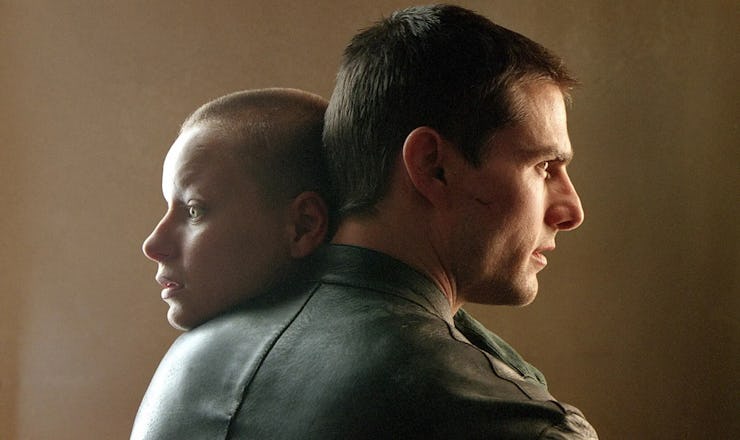
Think of Minority Report and your mind’s eye probably conjures up Tom Cruise wildly gesticulating as he moves computer “screens” through thin air. But the storyline that drives the film (and the original short story it’s based on) — a breakneck good-guy-versus-government-corruption battle fueled by state-sponsored paranoia — means Minority Report has never felt more relevant. And as a result, often imitated.
Based on a 1956 short story by Philip K. Dick, Minority Report is set in 2054 and a future where Washington D.C. is monitored by an experimental law enforcement division known as the Precrime program. Its goal: prevent murders by knowing when they’ll happen. That all hinges on the abilities of three humans, known as “Precogs,” who are capable of looking into the future. Precrime officers act on the Precogs’ visions, arresting supposed murderers before they get the chance to act. The system seemingly works until the Precogs mark commanding officer John Anderton ( Tom Cruise ) as a future murderer, and he’s forced to go on the run. In the process of trying to clear his name, Anderton spars with Colin Farrell’s Danny Witwer, a rival government agent, and discovers a dangerous conspiracy hidden in Precrime’s history.
Given it was directed by Steven Spielberg , there’s little surprise that the film itself continues to hold up. Minority Report is as entertaining and technically brilliant as anything else the Jaws filmmaker has created. It moves at a breakneck pace and features standout performances from Farrell and Samantha Morton (as Agatha, the most adept of Precrime’s three Precogs).
It’s worth revisiting just for its stunning one-take aerial sequence. The now-iconic scene, which unfolds about halfway through the film and follows the Precrime’s Spyder robots as they scan the various residents of an apartment complex, is one of Spielberg’s more jaw-dropping visual moments.
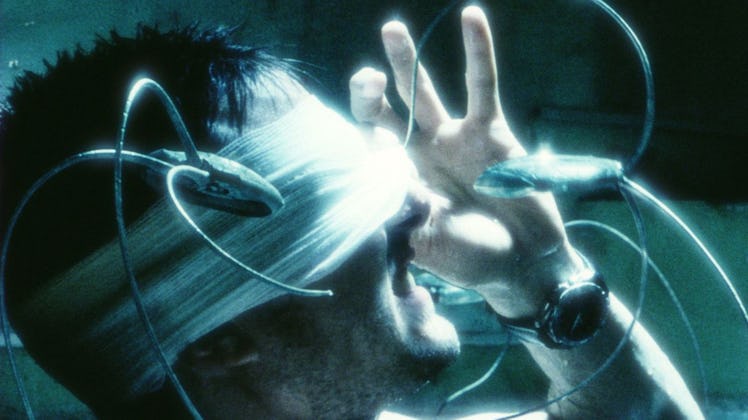
John Anderton (Tom Cruise) finds himself surrounded by a swarm of Spyder robots in one of the tensest moments in Minority Report.
What makes Minority Report feel relevant today is the paranoia, stoked by a deep distrust of Big Brother, that underpins the film. In a post-Snowden world where both the U.S. government and private businesses alike gather more information about American citizens than they ever have before, Minority Report ’s concerns no longer seem like science fiction so much as present-day fact. Even in relation to the ubiquity of target marketing and social media algorithms, the film can read as a warning against technologically-enhanced assumptions in the hands of institutions that keep promising that it’s all for our benefit.
What’s more, Philip K. Dick’s depiction of “pre-crime,” brought to life by Spielberg, has clearly lodged itself in the minds of Hollywood filmmakers. Even Marvel borrowed the “What if you could stop crime before it happened?” premise twice now. First for 2014’s Captain America: The Winter Soldier , which revolves around a government plan to preemptively target potential terrorist threats, and then again in this year’s Moon Knight . The central antagonist in the Disney+ series is a cult leader intent on dispatching anyone who his deity believes may one day hurt another person.
The result is that, 20 years on, Minority Report — the story and the film — is something of a triple threat. It’s quietly influential. It’s an underrated entry in Spielberg’s career. And it’s enduringly relevant, increasingly so, year after year.
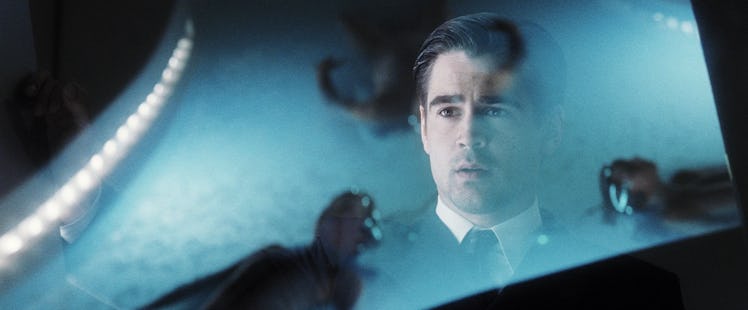
Colin Farrell as Danny Witwer in Steven Spielberg’s Minority Report .
This article was originally published on June 18, 2022
- Science Fiction
Minority Report Tried to Warn Us About Technology
Steven Spielberg’s film predicted how having more convenience would mean sacrificing personal freedom.

In Minority Report , when the detective John Anderton goes on the run in Washington, D.C., one of the first things he needs to do is swap out his eyes. The police of Steven Spielberg’s film, set in 2054, are not the only ones tracking people with eye-scanning machines mounted around the city. Public transit does so too, as does every business, and even all the billboards, which scream slogans such as “John Anderton! You could use a Guinness right about now!” as he walks by them.
That tracking system is the most mundanely frightening part of the film’s surveillance-state future, in which you might be arrested for a crime you haven’t yet committed. After a harrowing back-alley surgery, Anderton (played by Tom Cruise) reemerges into society with a new set of eyes. When he pops into a store, a holographic attendant greets him cheerfully: “Hello, Mr. Yakamoto! Welcome back to the Gap! How did those assorted tank tops work out for you?” The laugh line is much needed in a high-tension movie, but when I watched Minority Report recently, in a time when every social-media app I use seems to be listening to and anticipating my wants and desires, the gag sent a new chill up my spine.
When Minority Report hit theaters 20 years ago, it was marketed mainly as a long-awaited first-time collaboration between Hollywood’s biggest director and one of its biggest stars. Beyond that, 20th Century Fox and DreamWorks mostly promised an action-packed chase movie, pushing the punchy tagline “Everybody runs.” The film certainly delivers on that front, with some of the most inventive visual flourishes of Spielberg’s career. In one scene, a team of flying policemen smashes into an apartment where dinner’s being made, and one of their jet packs flash-fries some burger patties . In another, Anderton fights his would-be captors in an auto factory, dives into the assembly line, and then drives away in a newly built car—a set piece Alfred Hitchcock had once supposedly fantasized about including in North by Northwest.
And yet: Every bit of Spielbergian fun in Minority Report is laced with unspoken menace. Lexus designed the avant-garde cars, depicting what automobiles of tomorrow might actually look like. The sleek design is appealing, but the car is also a self-driving pod that offers its user no real control, changing direction to take Anderton straight to jail when he’s eventually discovered. A wide array of forward-thinking technology in the film was cooked up by experts whom Spielberg asked to envision life five decades hence, and in almost every case, advances in convenience come with insidious restrictions on personal freedom.
Read: Minority Report and the drawbacks of foresight
The central concept of Minority Report , based on a novella by Philip K. Dick, is that D.C.’s new “Precrime” division has eliminated murder in the city by tapping the brains of three psychics dubbed “precogs,” whose dreams of death are used to prevent killings before they happen. The notion is troubling: Police scrutiny has expanded into a guessed-at future, though the program is publicly presented as such a triumphant success that the city is lobbying to expand it nationally. “We are arresting individuals who have broken no law,” grouses Danny Witwer (Colin Farrell), the Department of Justice agent brought in to evaluate the system. But they will , he’s assured. Anderton is Precrime’s most devoted advocate—until the precogs predict that he’ll murder someone in the next 36 hours.
That’s when he goes on the run, resolute in the belief (like much of the quarry he’s chased) that he’s innocent. And then the superficially benevolent culture around him starts to close in. The viewer never sees any public opposition to Precrime, or to the brutal tactics employed by its agency; propagandistic commercials boasting about the end of murder are seemingly enough to silence any protest. One extraordinary sequence sees Anderton hiding out in an apartment building after his eye surgery. The cops storm in, but rather than simply batter down doors, they toss out insect-like drones named “Spyders” that roam the halls, scanning every inhabitant. In one unbroken shot , the camera pans from room to room as the Spyders breach each home, a sinister manifestation of a society without privacy.
Minority Report ’s world building never feels particularly didactic—Spielberg’s persistent need to entertain his viewers means that even the most unsettling material is a delight to watch and rewatch. Still, the film was not quite a runaway success on the scale of his other releases around that time, such as The Lost World: Jurassic Park and Saving Private Ryan . It grossed only $132 million domestically. Summer theatergoers may have picked up on the movie’s gloomy tone: Spielberg’s regular cinematographer, Janusz Kamiński, gave it a washed-out color palette by overlighting scenes and then bleach-bypassing the film negative, similar to what he’d done for Saving Private Ryan . The aesthetic is pitch-perfect for the noir-y tale Spielberg is telling. But in the summer after September 11, 2001, the films that did best at the box office had a much poppier accent, including Sam Raimi’s Spider-Man and the breakout hit My Big Fat Greek Wedding .
The dark outlook is, however, of a piece with much of Spielberg’s oeuvre in the 2000s. In the years just before and after Minority Report , his output ranged from mercilessly sad to doggedly bittersweet. By 2005, he’d made two of his grimmest works and his most obvious responses to 9/11, War of the Worlds (which reunited him with Tom Cruise) and the acidic revenge film Munich . War of the Worlds depicts mass destruction (via alien invasion) with visceral terror, and Munich investigates the worthlessness and cruelty of government-sponsored vengeance after a national tragedy.
But Minority Report , though it was written and filmed before 9/11, might be Spielberg’s most prescient work of all. Tasked with predicting our near future, he imagined an America filled with dazzling inventions but rotting from the inside out, one in which the erosion of civil liberties is thinly veiled by chest-thumping braggadocio about technology’s power to solve every problem. Spielberg's eye-scanning cameras and autocratic cops could easily be exchanged with the overreach of the PATRIOT Act, or the NSA listening in to casual conversations. The film’s warning is one the world is only beginning to heed. We may not have precogs dreaming of murders in police precincts, but so much beloved technology of today is just as effective at watching and constricting our lives.
Screen Rant
Every upcoming tom cruise movie.

Your changes have been saved
Email Is sent
Please verify your email address.
You’ve reached your account maximum for followed topics.
Millie Bobby Brown's New Netflix Record Leaves No Doubt About Her Stranger Things Replacement
Netflix's hit new thriller with 92% on rotten tomatoes creates a major trend after success 5 months ago, alien: romulus is revisiting 1 unexplained detail from the very first xenomorph scene.
Tom Cruise is one of the most popular actors of his generation, and here’s every upcoming movie he will appear in. Tom Cruise was born on July 3, 1962, and made his big-screen debut in 1981 in the romantic drama Endless Love , where he only had a bit part. Later that year, he had a supporting role in the drama Taps , which helped open more doors for him in the entertainment world. Cruise’s breakthrough came in 1983 with the teen comedy Risky Business , where he played the lead role. Later, in 1986, his role as Pete “Maverick” Mitchell in Top Gun helped cement his superstar status.
Since then, Cruise has worked with a number of directors and explored various genres – from gothic horror with Interview with the Vampire , where he played vampire Lestat, to action spy movies like the Mission: Impossible saga and psychological dramas like Stanley Kubrick’s Eyes Wide Shut . Although he has also been part of less popular and successful projects, such as the 2017 version of The Mummy , Cruise continues to be quite popular with the audience, in big part thanks to the Mission: Impossible franchise, which continues to produce more and more movies, all starring Tom Cruise as Ethan Hunt.
Related: Every Movie Tom Cruise DOESN'T Run In
Although Mission: Impossible continues to be a priority in Tom Cruise’s career, he already has other projects lined up, of which not much is known, but they will take him on different adventures, including one in outer space. In addition to that, fans are waiting for the highly anticipated sequel to a 1980s classic to arrive, as its release date had to be delayed due to the coronavirus pandemic . Here’s every upcoming Tom Cruise movie:
Top Gun: Maverick
First on the list of Tom Cruise’s upcoming projects is Top Gun: Maverick , a sequel to the 1986 movie Top Gun . Directed by Joseph Kosinski, Top Gun: Maverick will see Maverick training a new generation of pilots, among those Bradley “Rooster” Bradshaw (Miles Teller), Goose’s son. This will push Maverick to confront the ghosts of his past and his deepest fears, culminating in a mission that demands the ultimate sacrifice from those chosen to fly. Also starring are Jennifer Connelly, Jon Hamm, Glen Powell, and Ed Harris. Top Gun: Maverick was originally scheduled for a July 2019 release, and was later pushed to June 2020. Due to the pandemic, Top Gun: Maverick was delayed to July 2021.
Mission Impossible 7 & 8
As mentioned above, the Mission: Impossible movie series is still alive and keeps on producing new content. The latest entry in the franchise was Mission: Impossible – Fallout , released in 2018. Fans of the series won’t have to worry about the franchise ending with Fallout , as a seventh and eighth movie are in development, with plans of filming back-to-back. Unfortunately, the pandemic also changed those plans, and Mission: Impossible 7 and 8 were rescheduled, with their new release dates being November 19, 2021, and November 4, 2022, respectively.
SpaceX Project
The weirdest and most ambitious project in Tom Cruise’s list of upcoming movies is one that is currently referred to as the “SpaceX Project”. This will take Cruise and company to space , with the purpose of shooting a movie in space on board the International Space Station. The mission is expected to happen in late 2021 and will count with Doug Liman as director, but details on the plot, characters, and more are currently unknown.
Another confirmed project starring Tom Cruise is Luna Park , with Doug Liman also directing. Luna Park has been in development for years and has been referred to as a "passion project" of Liman. Just like SpaceX Project , Luna Park is a sci-fi movie, with the story following a group of renegade employees who “ venture to the moon to steal an energy source ”. Luna Park doesn’t have a projected release date yet, but hopefully, it will see the light soon.
Next: 2021 Could Finally Give Tom Cruise A $1 Billion Movie
Key Release Dates
Mission: impossible - dead reckoning, mission: impossible - dead reckoning part two.
- SR Originals
- Top Gun: Maverick (2022)
10 Tom Cruise Movies That Could Use a Sequel Like 'Top Gun: Maverick'

Your changes have been saved
Email Is sent
Please verify your email address.
You’ve reached your account maximum for followed topics.
The 10 Most Rewatchable Crime Movies of the 2010s, Ranked
Luc besson’s movies, ranked by how absurd they are, 10 slasher movies that are perfect from start to finish, read update.
Tom Cruise will be back on the big screen with the upcoming Mission: Impossible - Dead Reckoning Part One (July 12). The three-time Oscar nominee has built a successful late career with this highly successful franchise, producing numerous sequels to one of his most iconic films. However, his filmography has several other acclaimed movies that could use a sequel, especially after last year's record-breaking Top Gun: Maverick .
Top Gun: Maverick has made a big splash at the box office, making $1.023 billion. It proves that people will still go to the movie theaters if something is playing; they are willing to pay to see it instead of finding something to stream.
Top Gun may be a 30-year-old movie, but it is a movie that fans are willing to pay and see, and because of the success of Top Gun: Maverick , there may be other Tom Cruise movies that need a sequel.
Updated on June 30, 2023, by David Caballero:
10 'risky business' (1983).
Risky Business is the movie that launched Tom Cruise into 80s superstardom and cemented him as one of the decade's biggest draws. The future movie star plays rich teen Joel Goodsen, who explores his sexuality and turns his home into a brothel during his parents' vacation trip.
Tom Cruise and Rebecca De Mornay 's Lana had great chemistry in Risky Business . Having these two characters cross paths again almost 40 years later would be interesting. What kind of work does Joel do now? Is Lana up to something interesting these days?
Watch on Paramount+
9 'The Color of Money' (1986)
The Color of Money is a Martin Scorsese movie that doesn't get the accolades of other films like Goodfellas , Taxi Driver , or The Departed . Many people don't know that The Color of Money is a sequel to the classic film The Hustler , also starring the late and iconic Paul Newman .
It would have been interesting to see Paul Newman and Tom Cruise on screen again. However, revisiting Cruise's character Vincent Lauria would still be great. Is he still arrogant and cocky like he was when he was younger, or has he matured? Does he hustle solo, or has he now become the mentor?
Watch on Tubi
8 'Cocktail' (1988)
The often mocked and critically reviled Cocktail is a movie that Tom Cruise probably wishes was forgotten. But despite all the hostility this film has received, it made a lot of money on its original release and has some excellent mixing drink scenes.
Cocktail is a movie that would probably be a better reboot than a sequel. Maybe cast Austin Butler as Cruise's character, Brian Flanagan. A sequel could be enjoyable, though. Was Brian Flanagan's business a huge success or a big flop? Did Brain and Jordan's ( Elizabeth Shue ) marriage work out, or are they now divorced?
Watch on Hulu
7 'Rain Man' (1988)
Barry Levinson 's 1988 drama Rain Man stars Cruise opposite Oscar winner Dustin Hoffman . The plot follows Charlie, a carefree young man who reunites with his brother Raymond, an autistic savant, following their father's death. Rain Man was a major box-office success and won several Oscars, including Best Picture and Best Actor for Hoffman.
A sequel to Rain Man could be interesting to explore, especially considering its bittersweet ending. Did Charlie and Raymond stay in touch despite the challenges? However, any potential follow-up would receive considerable criticism, considering Hoffman, a neurotypical actor, would be portraying a character with autism.
6 'Jerry Maguire' (1996)
Cruise delivers arguably the best performance of his career in Cameron Crowe 's 1996 sports romantic comedy Jerry Maguire . The actor plays the titular role, a sports agent who starts his own management business, joined only by Dorothy Boyd, a young single mother. With only one client to his name, Jerry falls in love with Dorothy as he tries to make his business work.
Jerry Maguire is among the all-time best romantic comedies . Cruise gives his most heartfelt, earnest performance as the slick and spirited Jerry Maguire, creating a compelling and sympathetic figure audiences fall instantly in love with. A sequel would be ideal, allowing fans to see how Jerry's business went and how his relationship with Dorthy developed.
5 'Magnolia' (1999)
Paul Thomas Anderson 's Magnolia isn't everybody's cup of tea; thus, a sequel might not be a particularly great idea. But a movie about an aging Frank TJ Mackey could be compelling. Cruise shocked and won over audiences by playing the misogynistic character Frank TJ Mackie. He is a charismatic jerk who teaches desperate guys how to get laid with his motivational speeches and products.
Cruise delivers career-best work in Magnolia , and it would be interesting to revisit a character like TJ Mackey over 20 years later. Has he changed? Is he still a jerk, or did his encounter with his father in Magnolia change him?
4 'Minority Report' (2022)
Cruise stars in Steven Spielberg 's 2002 sci-fi action thriller Minority Report . Set in a future where a police organization can stop crimes before they happen using clairvoyants known as "precogs," the plot centers on John Anderton, a man on the run after being accused of a crime he hasn't committed yet.
A chilling movie about the dangers of surveillance , Minority Report is among Spielberg's most interesting and thought-provoking efforts. A sequel could explore the fate of the prisoners released at the film's ending while following the precogs' stories. Cruise and Samantha Morton would return, ideally with Spielberg's involvement.
Watch on Showtime
3 'Tropic Thunder' (2008)
Ben Stiller directed and starred in the 2008 war comedy Tropic Thunder . The plot centers on a group of arrogant actors shooting a war movie without realizing they have been dropped in an actual war. Cruise plays the scene-stealing supporting role of Les Grossman, the film's vulgar producer.
Tropic Thunder is among the 21st century's best war comedies . Cruise delivers an outrageous performance as the over-the-top and profane Les Grossman, becoming one of the film's most memorable aspects. A sequel focusing on Grossman would allow Cruise to flex his comedic muscles while delivering another scathing satire of Hollywood.
2 'Knight and Day' (2010)
Cruise stars opposite Cameron Diaz in James Mangold 's romantic action thriller Knight and Day . The story revolves around the quirky June Havens, a woman who becomes accidentally involved in a dangerous plot after meeting the charming Roy Miller in an airport on her way to her sister's wedding.
Benefitting from Cruise and Diaz's electric chemistry, Knight and Day expertly blends romance with action and humor. A sequel would continue June and Roy's story, perhaps showing them on another globe-trotting mission together. Audiences hardly need a reason to see these two movie stars together, especially if they're kicking bad guys' butts!
1 'Edge of Tomorrow' (2014)
Doug Liman 's ambitious and cerebral sci-fi Edge of Tomorrow stars Cruise and Emily Blunt . The plot follows Major William Cage, a PR official with no combat experience, who finds himself trapped in a time loop after being sent to battle during a violent alien invasion.
Cruise and Blunt are perfect together, with the actor delivering one of his most unexpectedly vulnerable performances. The film ends with a decisive victory for humanity; however, Edge of Tomorrow 's weighty plot leaves several possibilities open, and making a sequel would be an easy and rewarding task.
Watch on Max
NEXT: Essential Tom Cruise Movies, Ranked
- Top Gun: Maverick (2022)

Tom Cruise Marks 10 Years Since “Edge of Tomorrow” with 'Great Friend' Emily Blunt: 'Incredible Memories'
"I love her performance in this film. Her dedication. Her humor. Her vulnerability and power. She brought it all," he said
Tom Cruise is marking a decade since the release of Edge of Tomorrow and praising costar Emily Blunt .
On June 6, the actor, 61, shared a post on Instagram reflecting on the production and release of 2014's Edge of Tomorrow, including his fellow cast and crew, especially Blunt, 41.
"It's been 10 years since Edge of Tomorrow first hit theaters!" Cruise wrote. "I want to take the opportunity to thank Emily Blunt once again for being such a great friend and brilliant actress . I love her performance in this film. Her dedication. Her humor. Her vulnerability and power. She brought it all."
"This anniversary brings back incredible memories," he continued, before thanking the film's director, more of his costars, including late actor Bill Paxton.
Related: Emily Blunt Reveals Tough Advice Tom Cruise Gave Her on 'Edge of Tomorrow' Set: 'We Got Through It'
"My first collaboration with Doug Liman. Rejoining the indomitable Brendan Gleeson. And my first time working alongside the great [Paxton]. His performance and the character he created left an indelible mark on this film."
Led by Cruise as a military public relations officer with little combat experience, Edge of Tomorrow is an apocalyptic sci-fi film that takes place after Europe has been occupied by aliens. Cruise's character is forced into combat against his will, and finds himself stuck in a time loop, fighting the same battles over and over again as Blunt trains him as a fighter.
"Hitting this kind of tone was no easy task," Cruise continued in his caption. "The writing and storytelling of Christopher McQuarrie made the movie work. Along with the dedication of our entire team who helped bring it to the screen — it was an absolute joy creating it with you all."
"To everyone who has enjoyed this film over the years, thank you for being a fan. And thank you to Warner Bros. for making this film," he added. "I can't wait to share more about the great movies we’re working on."
Related: Emily Blunt Clarifies Story About Tom Cruise Giving Her Advice: 'Still Something We Laugh About'
Blunt has also been candid about her time on the film, opening up in a 2022 interview on the SmartLess podcast, hosted by Jason Bateman , Will Arnett and Sean Hayes , about the physical difficulties she had on the set.
"We had to wear these enormous suits, which I think would've been great if we had CGI'd them, but we wanted to do it in a tactile way," Blunt said during the podcast, noting "there was nothing cozy" about these 85-lb. suits.
"I was like, 'Tom, I'm not sure how I'm going to get through this shoot,' and just started to cry," Blunt continued, before revealing how Cruise got her to laugh and power through the production.
"I was like, 'I'm feeling a bit panicky about the whole shoot,' and he literally goes — he just stared at me for a long time, not knowing what to do, and he goes, ' Come on, stop being such a p----, okay ?'"
Related: Emily Blunt Says Tom Cruise Was 'Such a Doll to Me' on Edge of Tomorrow Set: 'I Loved Him'
The PEOPLE Puzzler crossword is here! How quickly can you solve it? Play now !
"And I did laugh, and then we got through it," Blunt added, though she noted that she ultimately did injure her ribs and collarbone during the shoot. "But the training was intense. It was like twice a day we trained for it."
While appearing at the Academy Museum of Motion Pictures in Los Angeles for a moderated conversation with filmmaker Rob Marshall last year, Blunt also spoke about working with Cruise on Edge of Tomorrow, sharing that he helps to "tighten the screws on everyone when it comes to what you think you're capable of."
"Because he can do everything and wants to do everything, it makes you want to meet him where he is at," she saide, adding, "He's so inspiring. Such a doll to me."
For more People news, make sure to sign up for our newsletter!
Read the original article on People .

Create a free profile to get unlimited access to exclusive videos, sweepstakes, and more!
This Week in Genre History: Minority Report predicted our future
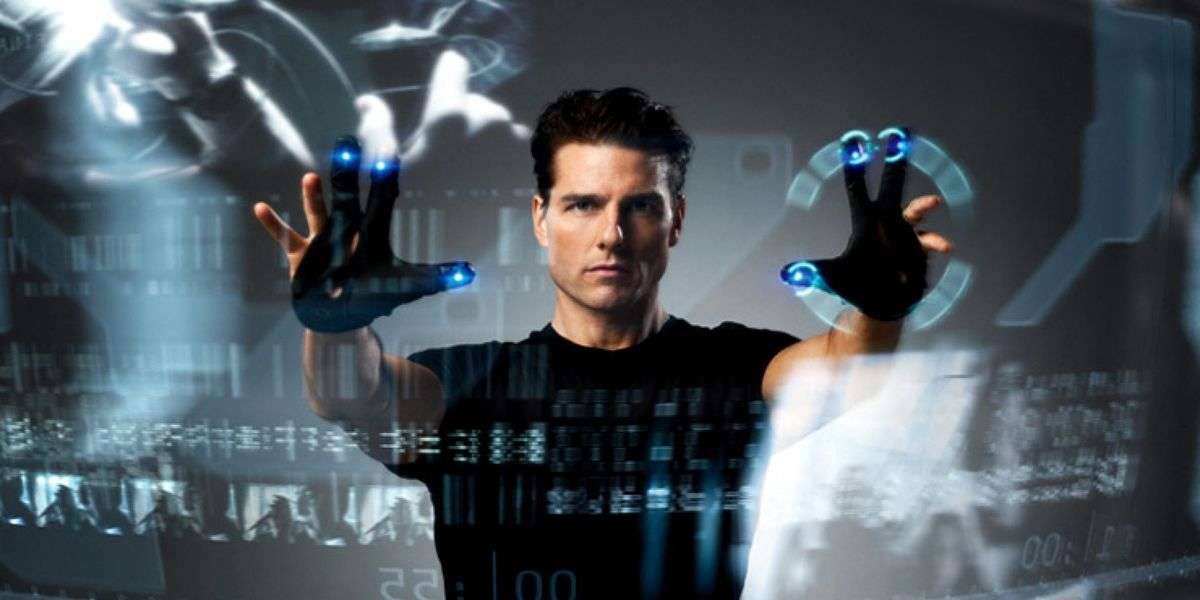
Welcome to This Week in Genre History , where Tim Grierson and Will Leitch, the hosts of the Grierson & Leitch podcast, take turns looking back at the world's greatest, craziest, most infamous genre movies on the week that they were first released.
For years, Hollywood tried to make a movie out of The Minority Report , the 1956 short story from Philip K. Dick , the visionary sci-fi writer whose work inspired Blade Runner and Total Recall . Then Steven Spielberg took the reins, approaching Scott Frank, the Oscar-nominated screenwriter of Out of Sight , to crack the story. There was one problem, though: Frank didn't consider himself much of a sci-fi guy. Spielberg wasn't concerned: "I said, 'Let me worry about the sci-fi element," he once recalled to the late Roger Ebert , about Frank. "Just write a terrific detective yarn. This taps into your strength. This is a murder mystery, a film noir, a whodunit.'"
Of course, Minority Report , which hit theaters on June 21, 2002, was much more than just a simple whodunit. Set in the year 2054 — when Washington, D.C.'s police is overseen by PreCrime, an elite law enforcement unit that arrests criminals before they can commit illegal acts — the movie starred Tom Cruise as John Anderton, a dogged PreCrime captain who's wholly devoted to his job, especially since his young son went missing and his wife left him. But soon, Anderton himself will be the target of his unit, which is powered by the PreCogs, a trio of psychics who can predict crimes and believe he will commit murder. Anderton goes on the run, trying to clear his name even though he hasn't done anything wrong. And because he lives in a future where retinal scans are everywhere so that the police (and advertisers) can find you at any moment, that means he's going to need some new eyeballs, which led to one of the film's most upsetting scenes.
Besides being a gripping action-thriller, Minority Report was a dark commentary on post-9/11 life — specifically, our collective anxiety about an American government that was increasingly invading our privacy in the name of national security. Disturbingly, that element of the film has only grown more prescient over time — not to mention its prediction of an extremely online society in which corporations target us individually in insidious ways.
That all of these bleak real-world ideas exist in what is, ostensibly, a summer popcorn movie featuring one of the planet's biggest movie stars, remains remarkable. Nearly 20 years later, Minority Report is both a terrific blockbuster and endlessly thought-provoking. It still feels ahead of its time.
Why was it a big deal at the time? Spielberg was already a two-time Oscar winner, cementing his reputation with 1998's Saving Private Ryan as a filmmaker capable of huge spectacle and serious drama. No longer dismissed as "just" the entertaining showman behind Jaws and the Indiana Jones movies, he was now in his 50s and essentially had his pick of projects. After Saving Private Ryan , he had turned his attention to a moody sci-fi drama close to his heart, A.I. Artificial Intelligence , which had been birthed by his hero Stanley Kubrick, resulting in a movie that evinced a darker view of humanity than you'd expect from one of cinema's great optimists. When Spielberg was getting ready for Minority Report , that darkness was still on his mind.
"Not a lot of skepticism has gotten into my work," he said around the film's release. "Certainly in the last few films — Amistad, Schindler's List , and Private Ryan , and A.I. and Minority Report — there's been a, well, I'm not sure I'd call it skepticism, but a being unafraid of the dark truth, the difficult realities. I feel as I've gotten older, I've gotten more courageous."
And if you're trying to be fearless, it makes sense that you'd work with Cruise, who's made his name doing his own death-defying stunts . Like Spielberg, he'd been showing newfound depth in his recent films, working with Kubrick on Eyes Wide Shut and Paul Thomas Anderson on Magnolia , memorably portraying the rabid misogynist Frank T.J. Mackey. But this was still a man who could put butts in seats: 2000's Mission: Impossible II was one of that year's biggest hits. So with Minority Report , you had this perfect storm of a blockbuster star and blockbuster director, both at the peak of their powers, deciding to trust their instincts and take chances. Storyboards weren't used — they simply hatched ideas on set every day.
"He's very experimental, and he's very prone to wanting to have the director say, 'Let's go off what you prepared and memorized, and let's go off script and try something new,'" Spielberg said of Cruise during a BBC interview. "He loves that. He lives for that ... Tom was always encouraging me to explore along with him and find things for him to do that were new and he hadn't done before."
Where Spielberg focused his preparation was in designing Minority Report 's future world, assembling experts for a three-day summit during preproduction. "When we started brainstorming we invited some of the far-reaching thinkers in the areas of science and medicine, technology, transportation, and the environment to imagine what the near future would bring," he told WIRED in 2002, later adding, "We had all of them in one room talking to each other. Most of the software in the movie is based on their suggestions of what it will be like in 50 years."
But what Spielberg couldn't have possibly imagined when he shot his film in the first half of 2001 was the tragedy of 9/11 that was soon to come. Released about nine months after the attacks on New York and Washington D.C., Minority Report was always meant to be a somber, noir-ish action movie — suddenly, though, it was a dystopian tentpole that felt incredibly timely.
What was the impact? Although boosted by glowing reviews, Minority Report wasn't a colossal hit, no doubt in part because of its downbeat story. The summer of 2002 was largely dominated by escapist films that helped audiences forgot the trauma of 9/11 — Attack of the Clones, Austin Powers in Goldmember , Men in Black II — and it's understandable that viewers weren't ready for a movie that unconsciously reflected this disturbing new age of terrorism and the surveillance state. (As film critic Roger Ebert pointed out at the time , America's new Department of Homeland Security was being proposed almost exactly when Minority Report came out.)
Nonetheless, the film served as a mirror, presenting a society in which law enforcement prosecutes citizens without a trial, all in the name of keeping people safe. As the U.S. government ramped up surveillance and warrantless wiretapping, eroding civil liberties in the process, Minority Report illustrated the dangers in such a system when (as Anderton learns) the watchdogs are corrupt.
And that's to say nothing of the movie's suggestion that we'd lose our privacy in other ways, too. Once Anderton goes on the lam, he discovers just how hard it is to hide when public digital ads can find you anywhere, trying to sell you things based on your previous purchases. "The Internet is watching us now," Spielberg said in 2002 . "If they want to, they can see what sites you visit. In the future, television will be watching us, and customizing itself to what it knows about us. The thrilling thing is, that will make us feel we're part of the medium. The scary thing [is], we'll lose our right to privacy. An ad will appear in the air around us, talking directly to us."
Eighteen years ago, Spielberg basically predicted our modern reality.
Has it held up? This remains one of Spielberg and Cruise's nerviest big-budget efforts. Minority Report is filled with excellent action set pieces, but it ripples with paranoia and dread as we follow along with Anderton on his desperate mission to save himself. (As Spielberg later put it , "I think my first direction to Tom was, 'No smiling!' I think I told him, 'You'll smile three times in this film. I'm not even sure where those three times will be. We'll discover those times together.'") It presents a world in which no one is really free — just like Anderton, we're all being monitored.
In subsequent years, there have been plenty of articles detailing what Minority Report got right about the future, including driverless cars and multi-touch interfaces. But what's perhaps scariest is that corporate marketing strategies are starting to follow the film's lead. In 2015, Jeff Malmad, the head of the marketing company Mindshare North America, predicted that wearable technology will allow "your shopping experience or your travel experience [to] be tailored so that the world around you bends to your likes and interests. …When I walk into that store my playlist could be running in the background, different lights could shine on clothing that will likely interest me, or that I've already searched for in that app."
Spielberg and Cruise would team up a few years later for a remake of War of the Worlds , which was a much bigger commercial success than Minority Report and a more overt commentary on 9/11 anxiety. But the quiet hum of menace that courses through Minority Report — and its bold, bleak look at where we're headed — still echoes today.
As Jon Cohen, Minority Report 's other credited screenwriter, saw it, the film had a simple but powerful message. "It's about righting a wrong," he said . "The system stinks: Fight it. Someone is suffering: Help them. Also, don't let anybody mess with your eyeballs."
Tim Grierson is the co-host of The Grierson & Leitch Podcast , where he and Will Leitch review films old and new. Follow them on Twitter or visit their site .
- Minority Report
- Steven Spielberg
- This Week In Genre History
Related Stories

Everything We Know About the New Jason Bourne Movie
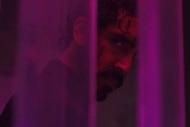
Monkey Man Streaming Exclusively on Peacock: How to Watch
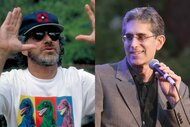
Jurassic Park's First AD on Working with Steven Spielberg
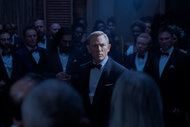
Daniel Craig Explains Why His James Bond Had to Die
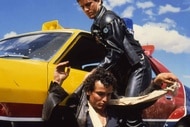
How Mad Max Pioneered the Post-Apocalyptic Worlds We Love
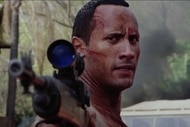
Remembering Dwayne “The Rock” Johnson in The Rundown

Knock at the Cabin's Abby Quinn on Getting Killed by Shyamalan
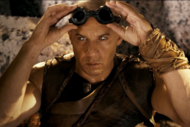
Vin Diesel Righted the Science Fiction Ship with Riddick
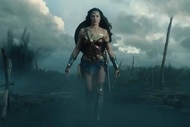
Wonder Woman: DC’s Most Complete Movie Since Batman
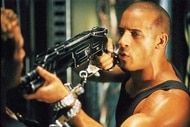
'Pitch Black' and the Science of Enhanced Vision

Chris Pratt Mourns Jurassic World Stunt Double
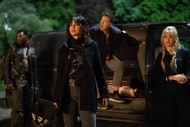
Abigail Star Reveals Alternate Ending for Vampire Flick
Recommended for you.

Linda Hamilton on Resident Alien Role: "I'm Not the Funny Girl, I'm the Straight Man"

The Classic Twilight Zone Episode That Inspired Jordan Peele's Us

Resident Alien's Alan Tudyk on Harry's New Love Interest, Edi Patterson's Blue Avian
Tom Cruise Remembers Edge Of Tomorrow, But When Is That Sequel Happening?
Happy 10th anniversary, Edge of Tomorrow!
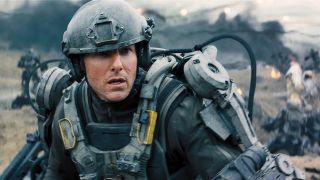
10 years ago today, you would have been able to buy a ticket to one of the best action movies we’ve ever seen, Edge of Tomorrow . Although the movie never took up the No. 1 spot at the box office during its time in theaters, it remains a top-tier thrilling science fiction film starring Tom Cruise and Emily Blunt in many cinephile’s hearts. With it’s recent anniversary in mind, Cruise has remembered the epic action flick.
Tom Cruise isn’t one to spam on social media. He chooses his moments, so on Thursday afternoon, he decided to pay tribute to Edge of Tomorrow with thoughtful words about the movie. He said:
It’s been 10 years since Edge of Tomorrow first hit theaters! I want to take the opportunity to thank Emily Blunt once again for being such a great friend and brilliant actress. I love her performance in this film. Her dedication. Her humor. Her vulnerability and power. She brought it all.
I can’t help but wonder if this tribute means we’ll be getting the Edge of Tomorrow sequel many have been hoping for! The comment section was, of course, riddled with calls from fans for another movie from the established world, but we don’t know if it’s happening yet.
The latest update we’ve heard about Edge of Tomorrow 2 was when Emily Blunt stated that she knew Cruise was interested in making a sequel, but she shared feelings that it might be too late to do so now . Blunt has previously been vocal about the continued back pain the movie caused her , but one would imagine she might change her mind if Cruise and the filmmakers had a really good idea for it. As the star continued in his Instagram post:
This anniversary brings back incredible memories. My first collaboration with Doug Liman. Rejoining the indomitable Brendan Gleeson. And my first time working alongside the great Bill Paxton. His performance and the character he created left an indelible mark on this film. Hitting this kind of tone was no easy task. The writing and storytelling of Christopher McQuarrie made the movie work. Along with the dedication of our entire team who helped bring it to the screen—it was an absolute joy creating it with you all.
Tom Cruise kept his working relationships with many of his Edge of Tomorrow collaborators. As he shared, it was the first time he got to be directed by Doug Liman , whom he later worked with on 2017’s American Made . It’s also a part of his ongoing partnership with Christopher McQuarrie, who had written and directed him in Jack Reacher prior to writing the script for Edge of Tomorrow .
After the 2014 movie, the pair made a Reacher sequel, The Mummy , four Mission: Impossible movies and Top Gun : Maverick together, with McQuarrie often changing between directing, writing and producing roles from one collaboration to the other. Here’s how Tom Cruise ended the tribute:
To everyone who has enjoyed this film over the years, thank you for being a fan. And thank you to Warner Bros. for making this film. I can’t wait to share more about the great movies we’re working on.
What do those comments mean? Is he hinting at “working on” another Edge of Tomorrow or just getting nostalgic on the movie’s 10th anniversary? We don’t know, but his comments only make us want a sequel more!
CINEMABLEND NEWSLETTER
Your Daily Blend of Entertainment News
While we wonder about that, you can see Tom Cruise next on the big screen for Mission: Impossible 8 , which is among the upcoming 2025 movies . Ethan Hunt will return, surely for more breathtaking action, just under a year from now, on May 23, 2025.
Sarah El-Mahmoud has been with CinemaBlend since 2018 after graduating from Cal State Fullerton with a degree in Journalism. In college, she was the Managing Editor of the award-winning college paper, The Daily Titan, where she specialized in writing/editing long-form features, profiles and arts & entertainment coverage, including her first run-in with movie reporting, with a phone interview with Guillermo del Toro for Best Picture winner, The Shape of Water. Now she's into covering YA television and movies, and plenty of horror. Word webslinger. All her writing should be read in Sarah Connor’s Terminator 2 voice over.
Fans Want Lord Of The Rings’ Viggo Mortensen In The New Movie, And He Recently Took Up Aragorn’s Sword For Another Movie
Jurassic Park Author Michael Crichton’s Posthumous Novel Eruption Is Getting Turned Into A Movie, And I’m Jazzed About The Latest Updates On Its Progress
I Saw A Preview Of Zack Snyder's Twilight Of The Gods, And The Animated Netflix Series Looks Like A Rad, Beautiful Depiction Of Norse Mythology
Most Popular
- 2 Fans Want Lord Of The Rings’ Viggo Mortensen In The New Movie, And He Recently Took Up Aragorn’s Sword For Another Movie
- 3 Hacks Is One Of The Best Comedies On Television Right Now, But There Is One Way The Show Could Be Even Better
- 4 Sabrina Carpenter Puts Barry Keoghan In Handcuffs For Latest Music Video, And It's An Iconic Move For The Couple
- 5 Jurassic Park Author Michael Crichton’s Posthumous Novel Eruption Is Getting Turned Into A Movie, And I’m Jazzed About The Latest Updates On Its Progress

IMAGES
VIDEO
COMMENTS
Minority Report: Directed by Steven Spielberg. With Tom Cruise, Max von Sydow, Steve Harris, Neal McDonough. John works with the PreCrime police which stop crimes before they take place, with the help of three 'PreCogs' who can foresee crimes. Events ensue when John finds himself framed for a future murder.
Minority Report is a 2002 American science fiction action film directed by Steven Spielberg, loosely based on Philip K. Dick's 1956 novella "The Minority Report".The film takes place in the Washington metropolitan area in the year 2054, in which a specialized police department—Precrime—apprehends criminals by use of foreknowledge provided by three psychics called "precogs".
Events ensue when John finds himself framed for a future murder. In the year 2054 A.D. crime is virtually eliminated from Washington D.C. thanks to an elite law enforcing squad "Precrime". ... lead up to the crime. As they cannot pinpoint the location of the crime, the PreCrime task force led by John Anderton (Tom Cruise), must perform a ...
"The Minority Report" was originally published in Fantastic Universe in 1956. "The Minority Report" is a 1956 science fiction novella by American writer Philip K. Dick, first published in Fantastic Universe.In a future society, three mutants foresee all crime before it occurs. Plugged into a great machine, these "precogs" allow a division of the police called Precrime to arrest suspects before ...
Tom Cruise playing the system in Minority Report (2002) Photo: Minority Report (2002) Official Trailer #1 - Tom Cruise Sci-Fi Action Movie/Movieclips Classic Trailers Fundamentally, this makes a ...
Based on a story by famed science fiction writer Philip K. Dick, "Minority Report" is an action-detective thriller set in Washington D.C. in 2054, where police utilize a psychic technology to ...
But twenty years later, this futuristic Tom Cruise sci-fi thriller feels chillingly relevant to our modern world. In the movie — based on a short story by Philip K. Dick and set in the year 2054 ...
In 2002, Steven Spielberg and Tom Cruise joined forces for the first time for the blockbuster "Minority Report." This tale of a future America where crime is prevented before it even happens is a ...
Tom Cruise as Jon Anderton in Minority Report. When Precrime Detective John Anderton is identified as a future murderer, he must race against his own specialized police force and time itself to prove his innocence of a crime he has yet to commit. "Minority Report" is Steven Spielberg and Tom Cruise's first collaboration as director/actor.
The first film to pair Steven Spielberg and Tom Cruise (the director and the star would reteam for 2005's War of the Worlds), ... Tom Cruise, (future) crime fighter.
Steven Spielberg's 2002 sci-fi thriller Minority Report unravels a twisted murder mystery that keeps the revelations coming right up until the end. Based on the story of the same name by Philip K. Dick, Minority Report stars Tom Cruise as John Anderton, the Chief of the Precrime Unit in a futuristic vision of Washington, DC. Using three psychics called "precogs," Precrime is able to see ...
Subscribe to CLASSIC TRAILERS: http://bit.ly/1u43jDeSubscribe to TRAILERS: http://bit.ly/sxaw6hSubscribe to COMING SOON: http://bit.ly/H2vZUnLike us on FACEB...
John Anderton (Tom Cruise) is law enforcer in a pioneering Pre Crime unit in Washington D.C. He catches murderers before they commit the crime thanks to some psychics called Precogs who can see these future crimes. Anderton is an ace cop who is also part Judge Dredd. He he also takes drugs.
It's fitting (and ironic) that Minority Report, a movie that spends most of its riveting run time concerned about the future, has only become more appreciated in hindsight.. Steven Spielberg's 2002 collaboration with Tom Cruise (his first) is arguably the director's most underrated film, a Raymond Chandler-esque detective yarn wrapped in big-budget future noir.
Marking the first blockbuster collaboration between the legendary director and actor Tom Cruise, the movie centers around Detective John Anderton, lead investigator of the government's Precrime unit. Relying on murky visions of the future from three beings known as the "Precogs," the agency works to stop murders in Washington D.C. before they ...
On June 21, 2002, Steven Spielberg and Tom Cruise unveiled the thriller Minority Report in theaters, where it became a summer hit and, later, an enduring sci-fi classic.
In the future, criminals can be arrested before they commit a crime... what could go wrong? Tom Cruise stars in Steven Spielberg's Minority Report. Now... | Netflix, film trailer, Tom Cruise
At a time when movies think they have to choose between action and ideas, Steven Spielberg's "Minority Report" is a triumph--a film that works on our minds and our emotions. It is a thriller and a human story, a movie of ideas that's also a whodunit. Here is a master filmmaker at the top of his form, working with a star, Tom Cruise, who generates complex human feelings even while playing an ...
Based on a 1956 short story by Philip K. Dick, Minority Report is set in 2054 and a future where Washington D.C. is monitored by an experimental law enforcement division known as the Precrime ...
Based on Philip K. Dick 's novella The Minority Report, the story centers on three clairvoyant humans known as precogs, capable of predicting violent crime before it happens. John Anderton ( Tom Cruise ), the pre-crime chief who is tasked with stopping the would-be crimes the precogs predict, is himself accused of a murder he hasn't committed ...
June 14, 2022. In Minority Report, when the detective John Anderton goes on the run in Washington, D.C., one of the first things he needs to do is swap out his eyes. The police of Steven Spielberg ...
First on the list of Tom Cruise's upcoming projects is Top Gun: Maverick, a sequel to the 1986 movie Top Gun.Directed by Joseph Kosinski, Top Gun: Maverick will see Maverick training a new generation of pilots, among those Bradley "Rooster" Bradshaw (Miles Teller), Goose's son. This will push Maverick to confront the ghosts of his past and his deepest fears, culminating in a mission ...
10 'Risky Business' (1983) Image via Warner Bros. Risky Business is the movie that launched Tom Cruise into 80s superstardom and cemented him as one of the decade's biggest draws. The future movie ...
Tom Cruise is marking a decade since the release of Edge of Tomorrow and praising costar Emily Blunt.. On June 6, the actor, 61, shared a post on Instagram reflecting on the production and release ...
Of course, Minority Report, which hit theaters on June 21, 2002, was much more than just a simple whodunit. Set in the year 2054 — when Washington, D.C.'s police is overseen by PreCrime, an elite law enforcement unit that arrests criminals before they can commit illegal acts — the movie starred Tom Cruise as John Anderton, a dogged PreCrime ...
Tom Cruise isn't one to spam on social media. He chooses his moments, so on Thursday afternoon, he decided to pay tribute to Edge of Tomorrow with thoughtful words about the movie. He said: It ...
The Russian operatives used the fake Cruise voice, the Netflix logo and even a fake New York Times review to try to lend the documentary legitimacy, according to analysts at Microsoft, who ...